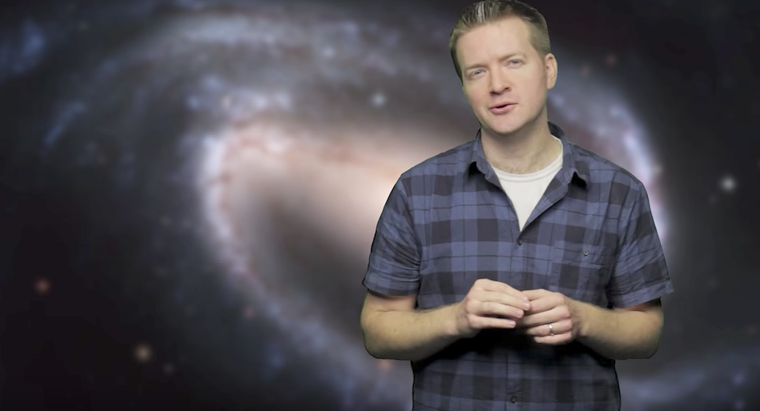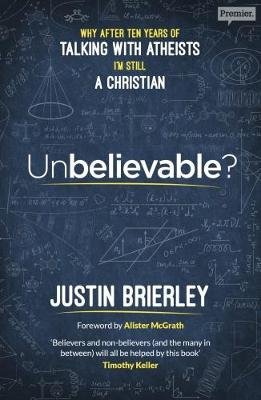3 reasons I'm not an atheist (and I'm still a Christian)
For more than 10 years I've been hosting a radio and podcast show called Unbelievable? that brings Christians and non-believers together to ask tough questions of each other. But the most common question I personally get asked is: How come you still believe?

It's a fair question. After years of moderating conversations that feature some of the brightest and most articulate atheists and sceptics on the planet, my faith should be shredded, right? But, as I explain in my new book Unbelievable? Why, After Ten Years of Talking with Atheists, I'm Still a Christian, my faith has actually become more confident because of the conversations I've had.
In over a decade of hosting the show I've learned that everybody inhabits a worldview of some sort – a set of metaphysical spectacles through which they view life, the universe and everything.
Almost every atheist I meet wears the spectacles of 'naturalism'. It's the view that there is no supernatural dimension to existence. All that really exists is physical matter in motion. Consequently, there is no realm of right or wrong to be discovered in life, no overarching purpose to things, no ultimate meaning to reach for in the universe. We are here by chance and we need to make the best of our brief existence.
But the more I've listened to this view of life, the less I'm convinced that it explains reality and the way we experience it. In contrast, Christianity is a worldview in which we are created, purposed and loved by a God who chose to get personally involved with us. And in my view it turns out to be a far better explanation of life, the universe and everything than atheism.
So here are three reasons why I'm not an atheist, and am still a Christian.
1. Because science points towards God, not away from him
The typical story in culture is that science has replaced our superstitious need for God. Now that we have natural explanations for the way things came to be, we don't need to invoke a supernatural deity.
Admittedly there are good reasons to be sceptical of a 'God of the gaps' approach to science. But there are 'good gaps' and 'bad gaps'. Bad gaps are born of ignorance. But good gaps appear because of what we do know, particularly when science reveals just how unfathomably complex and intricately woven our universe is.
For instance, in the past 60 years science has confirmed that the universe had a beginning some 14 billion years ago. It was a stunning discovery. Everything we experience as reality today – space, matter, even time itself – hasn't always existed. What caused it to be?
Science has also confirmed that the existence of life in this universe is incredibly unlikely. The only reason we are here to marvel at our existence is because of the extraordinarily fine-tuned nature of the physical forces and numbers that the cosmos was birthed with, that would allow life to develop one day. It didn't have to be this way (and the odds are firmly against it) yet here we are.
The universe and the life contained within it are both crying out for an explanation that goes beyond science.
Even science itself needs an explanation. The very fact that the physics of our universe can be mapped out in elegant mathematical equations is a bizarre and unusual fact of reality. When BBC broadcaster and atheist scientist Jim Al-Khalili came on my Unbelievable? show he acknowledged: 'It's a huge philosophical question: why does nature speak the language of mathematics?'. Nobel Prize winning physicist Eugene Wigner termed it 'the unreasonable effectiveness of mathematics', describing it as a 'wonderful gift we neither understand nor deserve'.
Are we to simply say 'pass' on this question?
On the atheist world view there is no rhyme or reason to the universe and our place in it. We are the chance by-product of an otherwise uninterested cosmos, while the fact that the universe is so hospitable to mathematical explanation is just a gigantic coincidence.
But what if these aspects of our universe are crying out for an explanation that reaches beyond the natural causes invoked by science? What if the better explanation of these facts is that we aren't the result of blind luck, but that we are here because we were intended from the very beginning? And we've even been granted the privilege of learning how to see the fingerprints of the grand designer across the very universe we inhabit.
2. Because human value isn't an illusion
On December 10, 1948, the United Nations ratified the Universal Declaration of Human Rights, a document globally regarded as a milestone in human rights. Its opening paragraph affirmed that 'recognition of the inherent dignity and of the equal and inalienable rights of all members of the human family is the foundation of freedom, justice and peace in the world'.
The development of the concept of universal human rights is generally seen as one of the moral high points in the history of civilization. It is a declaration upheld by people of all faiths and none. Yet, the belief that humans are created free, equal and with inherent dignity only makes sense if there is a God. Why?
Given an atheistic worldview there is really no reason to privilege human life over any other life form on the planet. If we are the product of an unguided process of evolution, then we are simply the organism that happens to have gotten lucky on the biological tree of life by developing a brain big enough to put us at the top of the food chain. Any morality that happens to have evolved in the process is equally a result of happenstance – whatever serves to pass on our genes most effectively.
So are the intrinsic human rights and value we bestow on each other merely an illusion foisted on us by our evolutionary history? I can't see how that can be true.
Think about other forms of morality that have developed at other times and places. People of colour were once considered inferior by the dominant population in parts of the USA. Exterminating baby girls because of a preference for males still happens in some parts of the world. Rape is not uncommon in parts of the animal kingdom as a means of passing on genes.
Why then do we view these things as unacceptable ways to treat other human beings, regardless of whether evolution happens to hand these beliefs down to us or not? These rights and wrongs about how we ought to treat fellow humans must be located in a realm other than the material facts of genes and biology. The law we find written on our hearts must be grounded by a transcendent lawgiver.
Our belief in the intrinsic dignity and worth of human beings is best explained by Christianity. The Universal Declaration of Human Rights tapped into a foundational view of humanity established by our Judeo-Christian heritage, one which we jettison at our peril. Our belief in the intrinsic value of humanity can't be explained by atheism. But if we are made in the image of God, as Christianity claims, then that gives every human being inestimable value.
3. Because that God-shaped hole really exists
It was Christian mathematician and philosopher Blaise Pascal who wrote, 'There is a God-shapedvacuum in the heart of every man which cannot be filled by any created thing, but only by God the Creator, made known through Jesus Christ.'
This sentiment, often termed the 'God-shaped hole', is repeated throughout human history. The universal search for love, purpose and meaning to life is common across all cultures, times and places. It informs every classical concerto in the concert hall and every pop song on the radio. It is at the centre of every work of art, film, literature and poetry.
We have never stopped asking the big 'why' questions. Even though we live in an age of more knowledge, comfort, technology, entertainment and distraction than our forebears could have dreamed of, we are still starving for meaning, hungry for more than the things this world can offer. Every self-help book, psychology magazine and agony aunt column is evidence of our common search for the key that unlocks the door to life in all its fullness.
Atheism has an answer. Illusionist Derren Brown told me when I interviewed him that we are primed to be 'story telling creatures'. As someone who has made a living from fooling people, he likewise believes that evolution has fooled us into thinking there must be a grand purpose to life, when there actually isn't one. But, as brilliant as his illusion and mind reading act is (I'm a fan), I don't buy Derren's explanation.
The rush of love I feel for my newly born child can certainly be explained by the biological forces that have shaped our instinct to protect and care for our offspring. But it can't explain away love. Love is more than chemicals, and we know it deep down.
When a piece of music moves us in a way that only music can, we may be able to give an explanation that involves air waves hitting our eardrum and producing electrical signals that cause the brain to release serotonin and adrenaline. But all we have done is explain a physical process. We haven't explained why Bach, Mozart or Jimi Hendrix take us to that other place.
I believe that these moments of transcendence are echoes of something that lies beyond the material world of physical explanations. CS Lewis termed it the 'argument from desire', writing:
'A baby feels hunger: well, there is such a thing as food. A duckling wants to swim: well, there is such a thing as water. People feel sexual desire: well, there is such a thing as sex. If I find in myself a desire which no experience in this world can satisfy, the most probable explanation is that I was made for another world.'
God is the best explanation
Whether it be the awesome and unusual fact of our existence, the intrinsic value that we place on humans, or our universal search for meaning, we are all presented with the same set of facts. The question is: Which worldview best explains these things? Atheism or Christianity?
For atheists like Richard Dawkins the answer is clear. He writes: 'The universe we observe has precisely the properties we should expect if there is, at bottom, no design, no purpose, no evil, no good, nothing but blind, pitiless indifference.'

I see a very different universe from the one Dawkins sees. Where the atheist scientist sees only physical processes and laws that give rise to illusions of value and purpose, I see real beauty, truth, love, good and evil, purpose to life, freedom to choose and, ultimately, hope.
As a Christian I believe that vision of life is most radically expressed in the person of Jesus Christ. Someone who claimed be the doorway to what life is really all about. His death on the cross was the ultimate expression of sacrificial love by a God who invests every human life with ultimate worth, and his resurrection the ultimate expression of hope for our lives to come as part of a restored, renewed creation.
That's not a pie-in-the-sky-wishful-thinking. It's a Christian faith that is informed by the reality of the universe we inhabit and our experience as humans within it. We are all searching for an explanation. In over ten years of talking with atheists, I've yet to hear a better one.
Justin Brierley is the presenter of the Unbelievable? radio show and podcast. His book 'Unbelievable? Why, After Ten Years of Talking With Atheists, I'm Still A Christian' is available at http://www.unbelievablebook.co.uk where you can also download the first chapter for free.











